'An amazing day for Britain' - How Murray ended a 77-year wait
Ten years on, the story of Andy Murray's historic Wimbledon win.
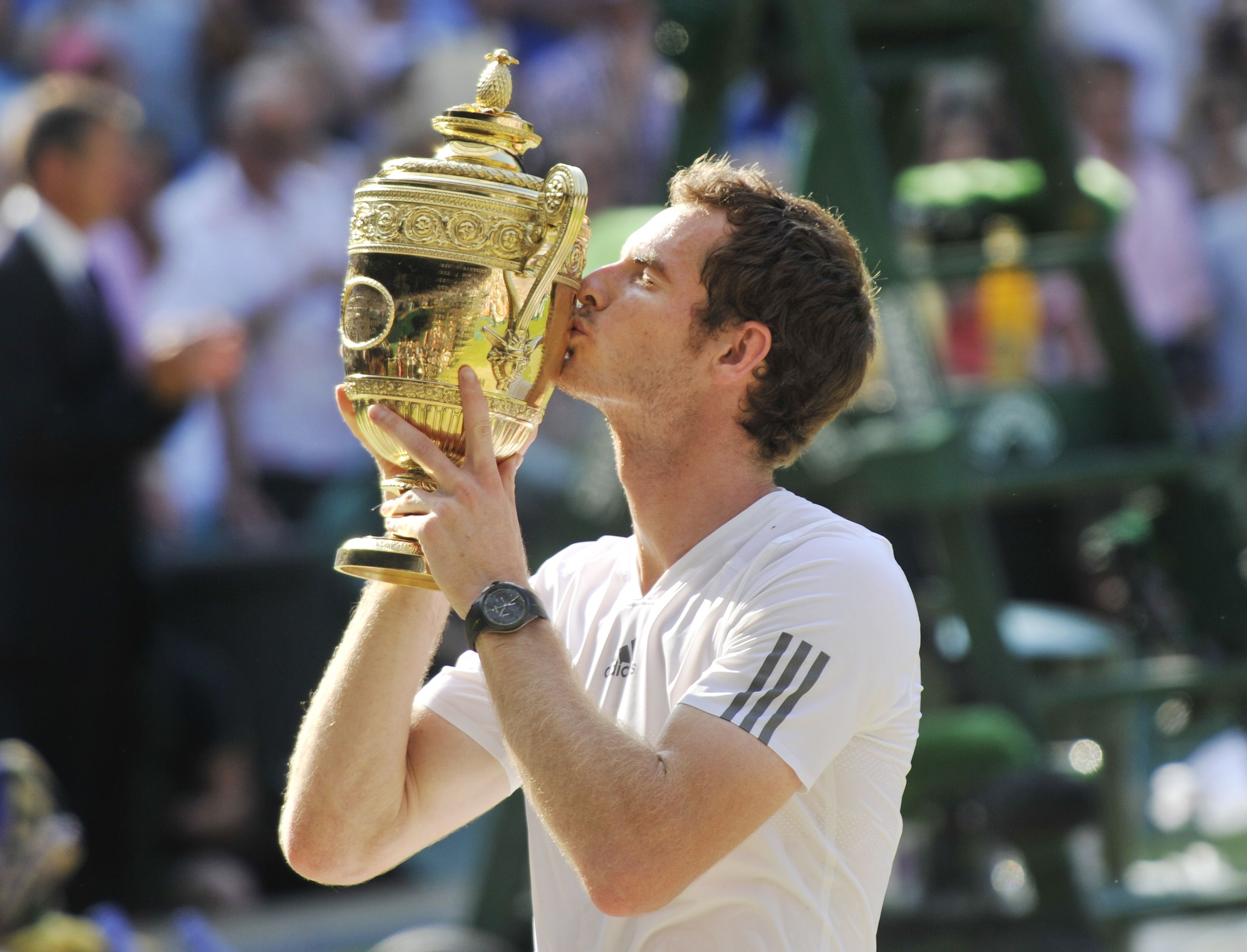
Going to the back of the court to grab a towel before serving for the match was something Andy Murray had done hundreds of times before.
Never, in a triumphant career where he had won his first Grand Slam singles title less than a year previously, had his arm shaken uncontrollably.
This wasn't just any match. This wasn't just any final.
Murray was serving for the Wimbledon title.
The 26-year-old was serving for British sporting immortality, trying to end the 77-year wait for a home men's singles champion, aiming to become the first winner since Fred Perry in 1936.
Championship point.
"When you look down and see your hand shaking, it doesn't help things," Murray remembers about trying to close out a straight-set win over Novak Djokovic.
Nervous energy was jolting through the 15,000 spectators on Centre Court, notably Murray's girlfriend Kim, who watched with her hands covering her mouth, and his parents Judy and Will.
Expressions on instantly recognisable faces - including British Prime Minister David Cameron, Scotland's First Minister Alex Salmond, England footballer Wayne Rooney, Spice Girl Victoria Beckham, Olympic hero Sir Chris Hoy and tennis legend Rod Laver - provided another visual narrative.
Exhilaration countered by unbearable tension.
The same emotions were felt around the country.
Thousands congregated on Henman Hill, by now rechristened Murray Mound, living every moment as the drama unfolded on the other side of Court One.
Away from the All England Club, millions more were hooked to their television screens, radios, mobiles or laptop computers.
Murray's journey from a boy growing up in the Scottish town of Dunblane to a man on the brink of national folklore had not been a smooth one.
For years, he had struggled to win over the British public.
"Andy works so hard at what he does and is a real perfectionist, so he shows his frustration and wears his heart on his sleeve," his mother Judy, who coached him from a young age, says in BBC Radio 5 Live documentary The Day We Won Wimbledon.
"I think those not necessarily in his corner previously were turned when he made them realise it is not easy growing up in the public eye and especially not in an individual sport like tennis.
"Now they could see this young guy who had been trying his heart out for years was close to achieving something incredible."
Ten years on, BBC Sport revisits the day which turned Murray into a Wimbledon champion, a national treasure, and the recipient of a knighthood.
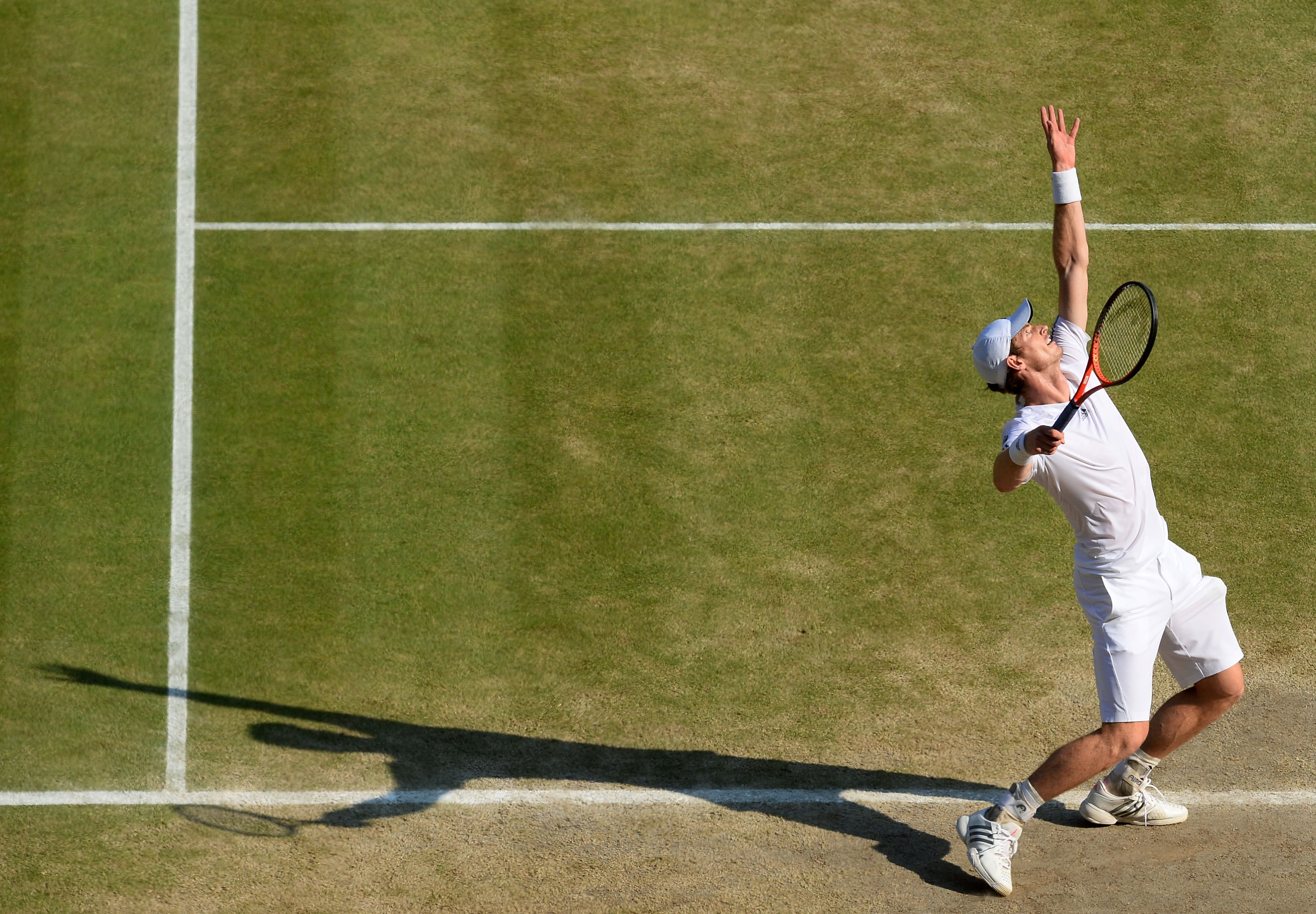
The journey
For so long, it had been a tale of near misses and heartbreak for Murray.
The tear-inducing loss to Roger Federer in the 2012 Wimbledon final, where the harsh reality of a fourth successive defeat in a Grand Slam showpiece saw his private emotional turmoil spill into full public view, proved to be the start of a catalytic period.
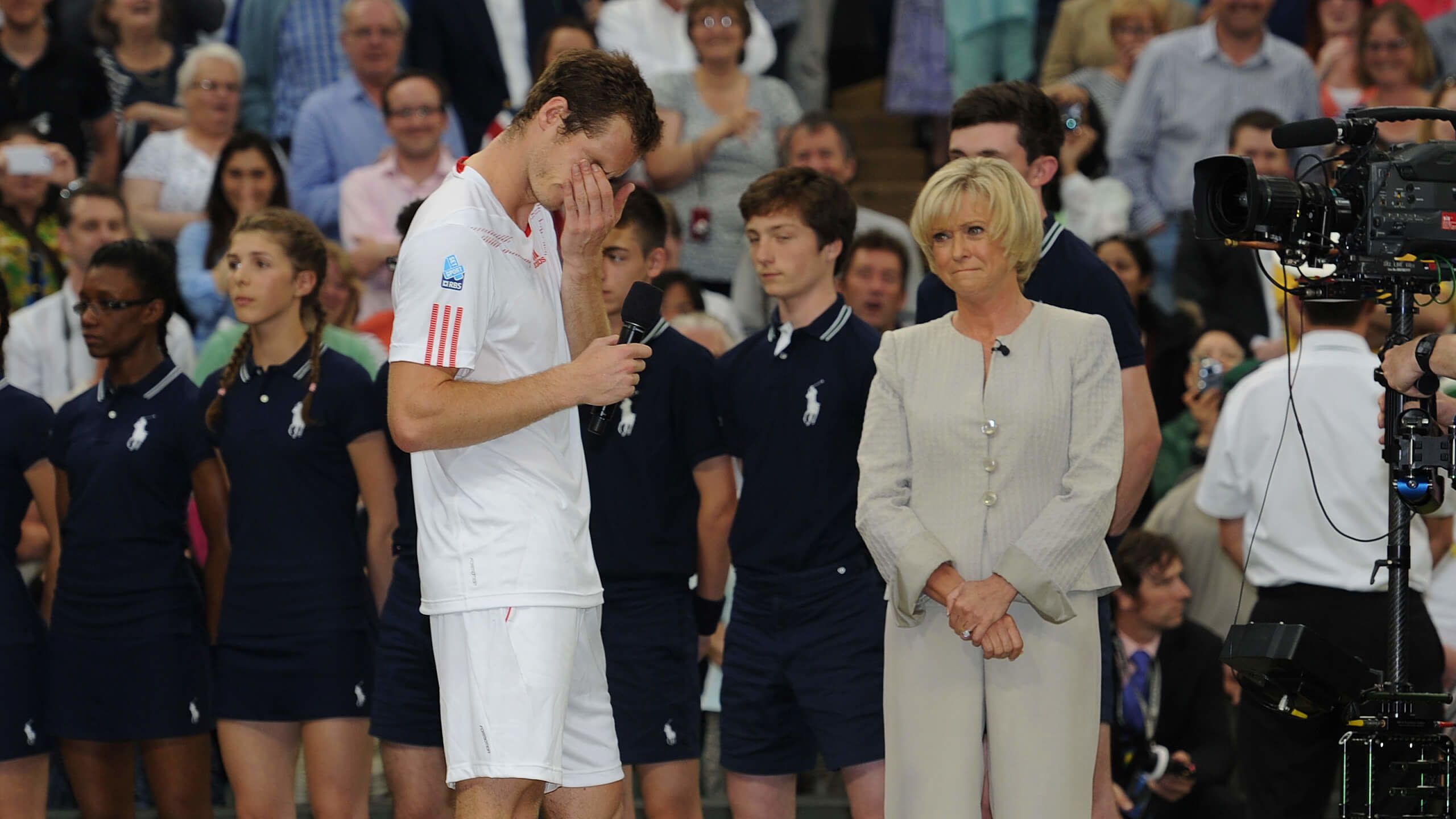
Less than a month later came the redemptive victory over Federer in the Olympic final on Centre Court, before he finally landed the status which he had long craved at September's US Open: a major champion.
"It felt like the stars were starting to align," Dani Vallverdu, who was part of Murray's coaching team alongside Ivan Lendl, tells BBC Sport.
"2012 was a special year. Winning the US Open took the monkey off his back.
"After reaching the Australian Open final in 2013, he missed that year's French Open with a back problem and it gave him plenty of time to prepare on the grass.
"It felt like 2013 was the best chance he had to win Wimbledon."
Murray had known Vallverdu since the pair were teenagers, meeting at the Sanchez-Casal Academy in Barcelona, where the Scot had moved aged 15 in a bid to turn prodigious talent into a professional career.
After Vallverdu realised his playing career was not following the trajectory he had dreamed of, he moved into coaching and joined his childhood friend's team in 2010.
Never did they talk about Murray's ambitions of winning Wimbledon. Never was the name Fred Perry mentioned.
"It was the big elephant in the room," Vallverdu says.
"I've known Andy since he was 16 and I don't think I have ever heard him say 'I want to win Wimbledon'.
"When I became part of the team it was one of them which was a given. We knew that was the goal. The more you talk about it, the more pressure you have.

"Within the team there was a clear direction - working, discussing, arguing and looking how to improve.
"The goal was to win Grand Slams. If it was Wimbledon, then even better.
"There was enough noise outside of the team to know what the historic value was to winning Wimbledon. We heard and read it every day.
"It was obvious to everyone - the British public and the tennis public - the significance of what Andy was trying to achieve.
"Our job as a team was to play it down, put it to the side and focus on what we needed to do for him to have the best chance to achieve it."


Murray's path to the 2013 final

First round
Opponent: Benjamin Becker (Germany)
Score: 6-4 6-3 6-2
Having seen Rafael Nadal stunned by Belgium's Steve Darcis earlier, there was never any threat of a first-round upset for Murray against the world number 92.

Second round
Opponent: Lu Yen-hsun (Chinese Taipei)
Score: 6-3 6-3 7-5
Another smooth passage for Murray against the world number 75 on a day when there was another shock - Roger Federer losing to Sergiy Stakhovsky.

Third round
Opponent: Tommy Robredo (Spain)
Score: 6-2 6-4 7-5
With expectation increasing following the exits of Nadal and Federer, Murray kept his focus to earn another straight-set win, this time over the 32nd seed.

Fourth round
Opponent: Mikhail Youzhny (Russia)
Score: 6-4 7-6 (7-5) 6-1
Murray survived some nervous moments against the 20th seed, especially in the second set, but came through again without dropping a set.

Quarter-finals
Opponent: Fernando Verdasco (Spain)
Score: 4-6 3-6 6-1 6-4 7-5
The first bump in the road. Murray was two sets down to the world number 54, but produced an astonishing comeback in a classic to keep his dream alive.

Semi-finals
Opponent: Jerzy Janowicz (Poland)
Score: 6-7 (2-7) 6-4 6-4 6-3
Another fightback, this time from a set down against the 24th seed and completed under floodlights at 9:35pm, gave Murray a shot at redemption.
The build-up
The morning
On 7 July 2013, Murray's date with destiny, a warm British summer morning started for him like it did for many people across the country - including the thousands who camped out in Wimbledon Park to grab a spot at the front of the Queue.
Breakfast outside.

Shortly after waking up about 7:30am at his Surrey home, Murray headed to the garden patio with his family and started fuelling his body for the coming hours.
"I was finding it hard to eat. It was already a hot day and I was very, very nervous," Murray says.
"But it was nothing compared to how I was feeling a few hours after that."
For his mother Judy, it was also the usual routine. A bowl of dusty granola splashed in cold, low-fat milk. Washed down with a glass of sharp orange and mango juice.
Nothing else felt normal.
"I was in a real daze," she recalls during an interview with BBC Sport at Queen's last week.
"I think a lot of that was to do with him having lost in the final to Roger the year before - he was devastated.
"You never know if you're going to get another shot at it. It is your dream since you were little, suddenly it's there, you don't quite make it, you feel like you've let everybody down.
"On the day of the 2013 final I was so nervous for him. I didn't want him to go through that same process of defeat, disappointment and despair."

Leon Smith, Murray's childhood coach who later became his British Davis Cup captain, tried to provide a calming presence when he joined Judy and another friend in Wimbledon Village.
"I'm a father of three and cannot imagine what it'd be like knowing what happened the previous year," the Scot, also interviewed recently at Queen's, remembers.
"The pressure for Andy and everyone close to him was massive."





The grounds
Temperatures were starting to rise by mid-morning. Anticipation even more so.

On the hottest day of the year, a rectangular piece of purple and green paper, with the Wimbledon logo embossed in the top left and a barcode stamped on the bottom right, was the hottest ticket in the UK.
"There is always a buzz around Wimbledon but particularly on that day," Sue Barker, the former French Open champion turned BBC television anchor, tells The Day We Won Wimbledon.
"Already, people were around early on and all dressed up, British fans coming in and thinking 'here we are again' - hoping we can finally clinch it and get a British men's champion.
"There was a different feel because Andy was a different player, he came into Wimbledon as a Grand Slam champion. People had more belief than they ever had before."
Among those arriving who were convinced Murray would be victorious was a man already fixed in the British sporting pantheon.

Sir Chris Hoy, the Scottish track cycling behemoth who was Britain's most decorated Olympian at that time with six gold medals, had known Murray and his mother for a number of years.
"Judy said 'there is an offer of a ticket, if you want it' - I didn't need asking twice," Hoy, who first watched Murray play at Wimbledon against David Nalbandian in his 2005 debut, tells BBC Sport.
"My wife Sarra and I went down to London. When we arrived we went up to the players' lounge to meet Judy and Andy's girlfriend Kim.
"There was such a buzz. There was a feeling this was the day, certainly for me. I was very confident he was going to do it."
As well as the 15,000 fans clutching their golden ticket for Centre Court, thousands more streamed into the All England Club to watch from Murray Mound.

Two of the fans heading for the hill were Christina and Andrew Buckingham, a couple from Chelmsford.
Three months earlier, they had bought grounds passes for the final Sunday from a friend who had organised a coach trip from the Essex city. Little did they know how things would turn out.
At 10:30am, as soon as the gates opened, they headed inside and made a dart for a prime spot on the famous hill.
"We sat on the brick wall around the pond at the back of Murray Mound, right in front of the big screen," Christina recalls to BBC Sport.
"We were armed with our picnic and set up camp for the day. Food in a big cool box, a little bit of booze. It was absolutely baking - so we had plenty of sun cream and water, too.
"Even at that time, four hours before the match, the atmosphere was brewing. Within an hour, there wasn't one inch of space free. Once we were sat there, we were bedded in for the day."
The locker room
After reaching at least the semi-finals of all four Grand Slams in 2011, Murray knew there was a missing ingredient. A robotic ability to ruthlessly win the biggest prizes.

Enter Ivan Lendl. Nicknamed 'The Terminator' in his 1980s pomp, the steely eight-time major champion was tasked with adding a top layer of formidability.
"There is no doubt in my mind that bringing Ivan into his team made the difference in converting semi-finals and finals into winning majors," Judy Murray says.
Working closely with Lendl was Vallverdu, the trusted lieutenant who travelled 42 weeks of the season with Murray, charged with implementing the Czech-born American's plan when he wasn't around.
Fitness coaches Jez Green and Matt Little, along with physio Andy Ireland, were the body mechanics.
Team Murray was a tight-knit unit. Usually there was plenty of banter, largely instigated by Little and Murray, with Vallverdu sometimes getting the brunt of the sarcastic jibes.

"When we were all together there tended to be a lot of joking around and having digs at each other. That day there was significantly less of that," Vallverdu says.
"I felt everyone was a bit more quiet as a team, everyone tried to be normal but inevitably it is difficult not to feel different on the day.
"In terms of routine, it was Groundhog Day.
"We arrived four or five hours before the final. Andy had an hour with the physio, then I went on court to hit with him. I was more nervous than usual. I felt he was more nervous than usual, too."
The pair hit on the same practice court at Aorangi Park they always did, Vallverdu tuning Murray up for half an hour before the pair left for the players' area in the Millennium Building next to Centre Court.
In a bid to avoid prying public eyes and trained camera lenses, the pair sneaked out of a private exit and walked back through an isolated car park. Solitude was bliss.

"The walk felt very different. Nothing was said. Zero. There was a lot silence," Vallverdu says.
"Andy was always focused at tournaments, especially during the British grass-court season, and more so at Wimbledon.
"In these moments you could always see, on his face, and his demeanour, he had a job to do. This day he was even more focused. I had never seen anything like it."



The match
The first set
Approaching 2pm on the final Sunday of Wimbledon, the stage was set.
As second seed Murray left the locker room, he exchanged handshakes with his team and they wished him good luck.
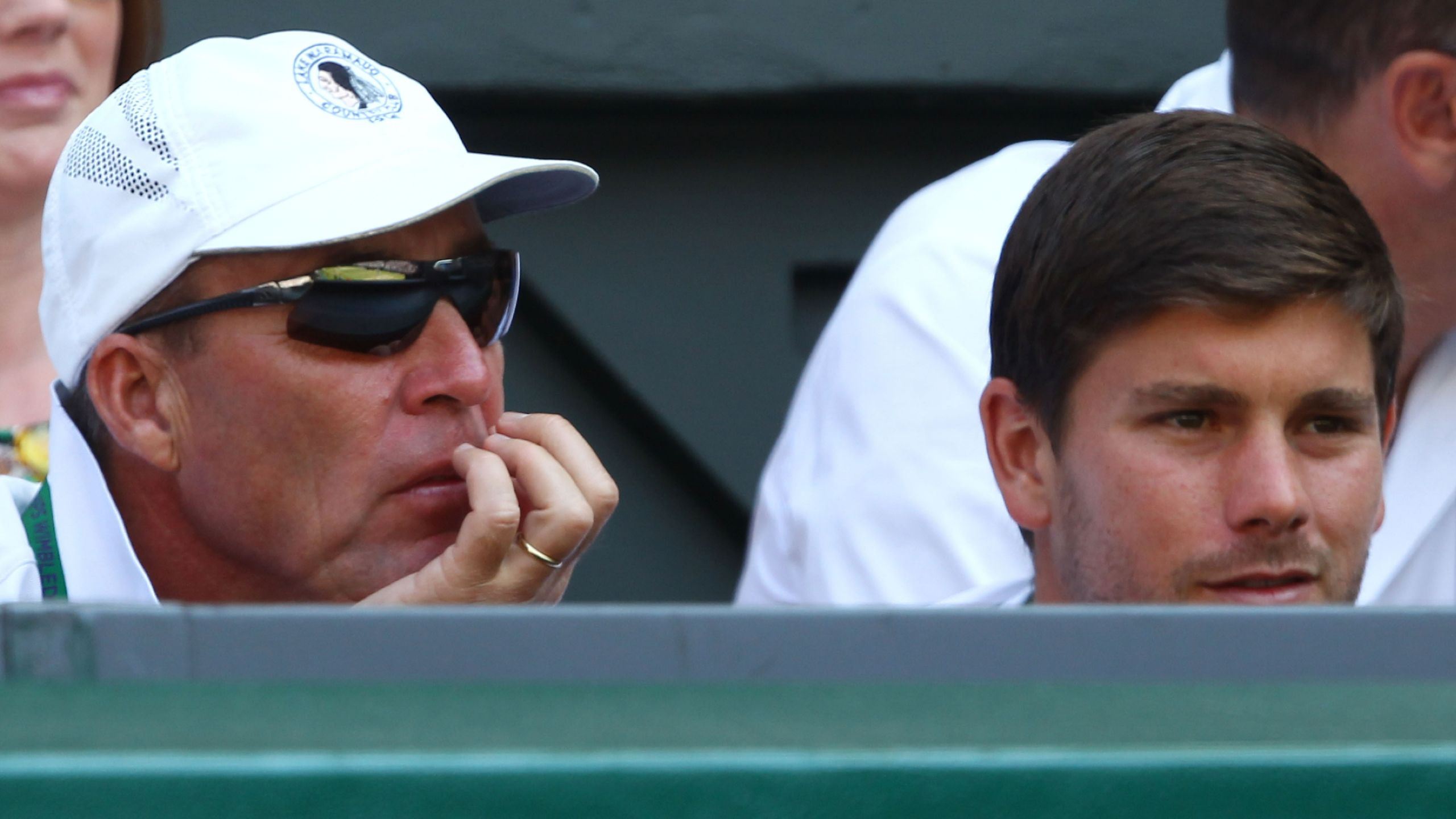
Murray's short walk down the marbled corridor to Centre Court took longer than Vallverdu's usual journey to the players' box via the bathroom.
This day, Vallverdu didn't want to arrive inside an already febrile stadium after Murray.
"Anyone who has been on Centre Court when Andy is playing will tell you that goosebumps are bound to happen," he says.
"I wanted to make sure I was there when he walked on court, so I rushed to the seat without going to the toilet.
"Wimbledon just feels different when Andy is on court - and particularly on that day. The roar was different. It was a very special feeling."

In sweltering conditions which courtside thermometers reckoned were almost 50C in the direct sun, Murray and Djokovic instantly started trading blows.
Murray took control from the outset against an unusually erratic Djokovic, converting his eighth break point after three dramatic games that took 20 minutes.
"There were pretty brutal points at the start, long points, long games. I was struggling for breath," Murray says.
The home supporters were brought down to earth immediately when top seed Djokovic recovered the break, but the Serb was leaking errors and Murray moved clear again at 4-3.
A tense game followed when Murray, serving into the sun, opened with two double faults. However, he fought his way out of three break points and served out the set to love.

A meticulous plan had been mapped out by Team Murray for the possibility of facing Djokovic on Centre Court. Now he was executing it.
"The way we talked about how Andy should play against either Roger of Novak in the final was clear," Vallverdu says.
"There were no questions marks about what he needed to do that day if he was going to give himself the best chance to win.
"That was months and years of training in a certain way to hopefully use it in a Wimbledon final.
"He started that match doing it - playing very solid, playing aggressive, making Novak move before Novak made him move early in the rally.
"That caused Novak to overplay a little bit at the beginning and make unforced errors he wouldn't usually do."



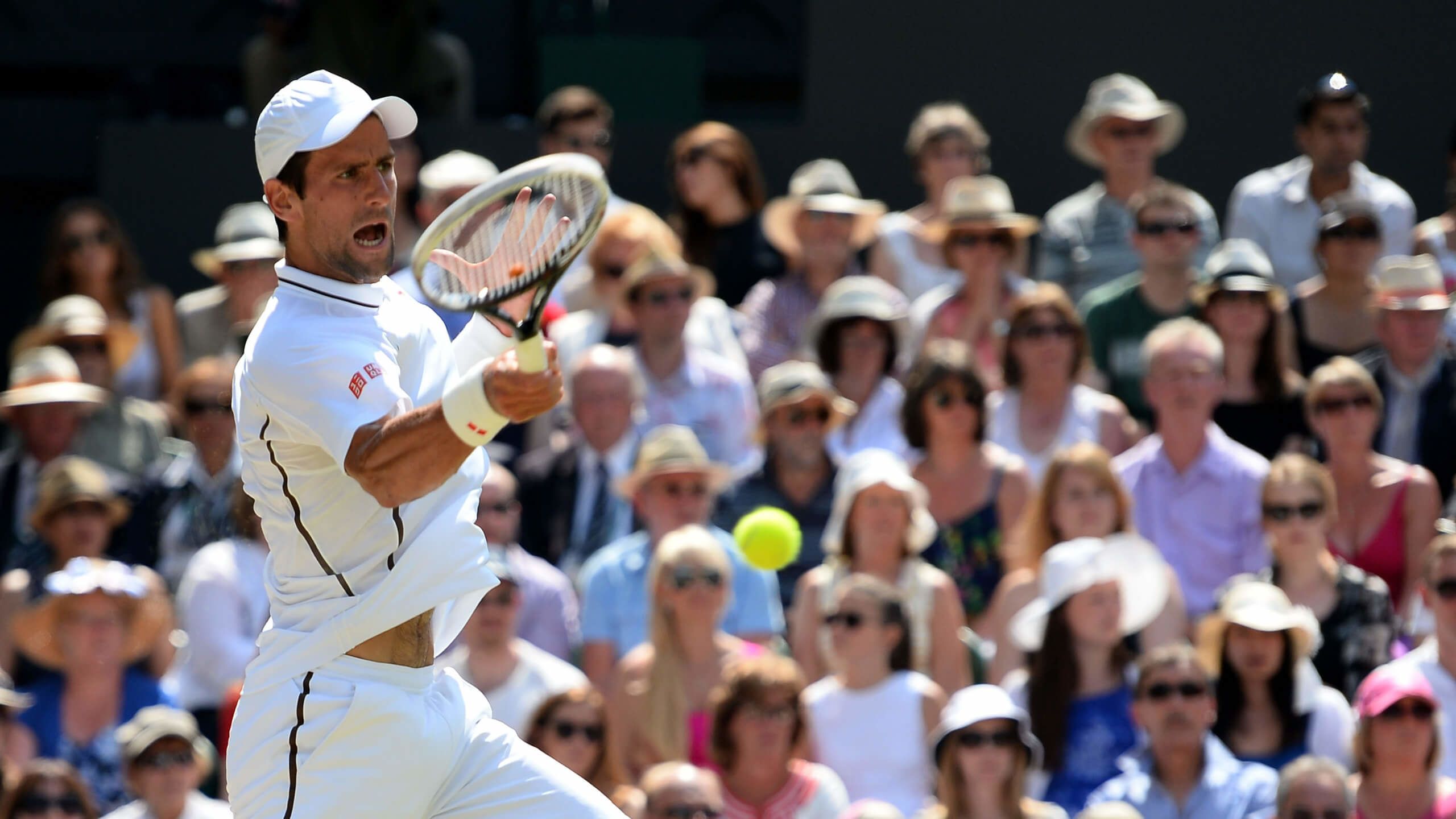

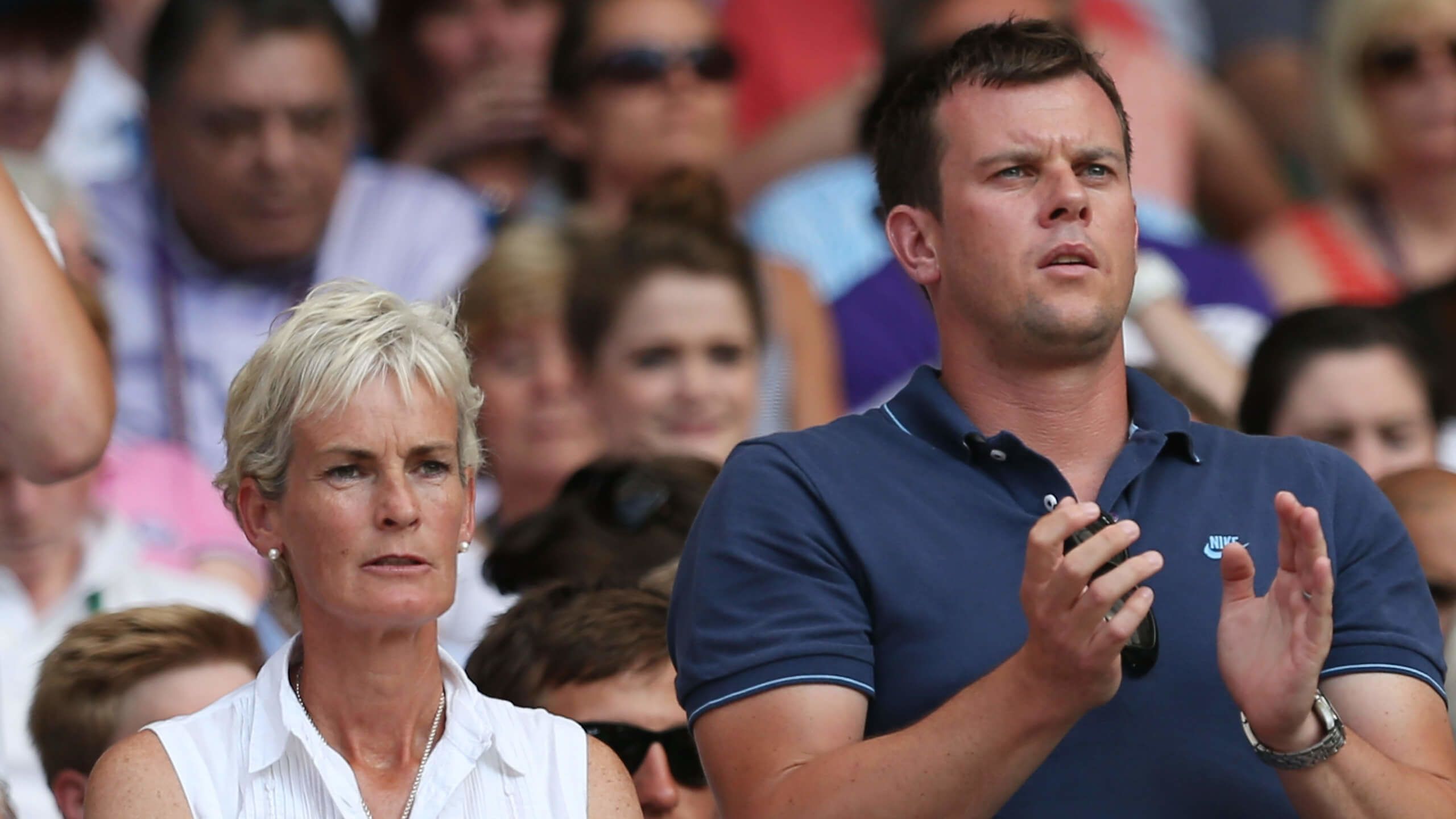
The second set
After almost an hour, Murray was a third of the way there. Of course, he had been in the same position against Federer 12 months earlier.
When Djokovic broke serve to move into a 4-1 lead, many fans around the country would have been forgiven for feeling a sense of deja vu.

Within Murray's team, however, there remained a confidence he would not allow a repeat of 2012. This felt different.
"When Andy played Roger, game-wise, Andy didn't believe enough in the way he should have kept playing," Vallverdu says.
"Against Novak, even though there were moments where he had to weather the storm, he didn't question the way he should play. He kept on doing it, even if he wasn't doing it as well or Novak was countering it better.
"There are times where you stick to your guns, own your game and own your gameplan. Andy did that. That's what gave him the better chance to get back into the match.
"That eased the tension in the team, 100%."

After struggling to defend his own second serve, Murray suddenly put pressure on Djokovic and the Serb succumbed with a double fault in game seven to put the set back on serve.
Murray cracked a 128mph ace and a nerveless smash to save two break points for 4-4, with Djokovic's vulnerability showing with a tirade at umpire Mohamed Lahyani over a line call when serving at 5-5.
Moments later he netted a forehand to give Murray a priceless opportunity and the Scot found his best serving form when he needed it.
An emphatic ace closed out the set and brought the crowd to its feet.

For everyone, time to catch breath. For some members of Murray's family, time for a sugary treat.
"My mother brought down a tin of shortbread - she makes unbelievable shortbread - and my brother opened it up and started passing it around the box," Judy Murray remembers.
"I was absolutely furious. Because to me it was like they had relaxed and thought it would be OK now. Actually, we had no idea what would happen.
"He offered me some shortbread and I gave him the filthiest look. He quickly realised it was a bad idea."
The third set
The hope had turned into a hive of hysteria.
But not all of Murray's nearest and dearest were able to be there to experience it.

His older brother Jamie, the doubles champion who won the Wimbledon mixed title in 2007, had already left London for a tournament in Germany.
"I was watching on my laptop in the hotel room," he recalls during an interview at the French Open last month.
"The stream was bad, I was battling with that. It wasn't even British commentary, I couldn't hear the crowd noise. There was zero vibe."
Through the grainy images and between bouts of buffering, he watched his younger brother break Djokovic's serve at the start of the third set, maintaining his momentum by winning seven out of eight games.
Nobody was foolish enough to write off the Serb yet.

Djokovic was already a bona fide great, even then when he had won six of the 23 major titles he now owns, and had fought back from two sets down to level against Murray in the US Open final.
Back he came, using drop shots to great effect and get Murray on the run, reeling off four straight games to lead 4-2.
Murray wrestled back the initiative to level at 4-4, hammering away at Djokovic forehand and drawing another error to move 5-4 clear.
One more game. Four more points. Sporting immortality within Murray's grasp.
"I can't believe this," Murray's girlfriend Kim Sears gasped.
Neither could Jamie Murray. Watching the computer in his Stuttgart hotel room with his wife Alejandra, the older brother was finding the experience "strange and extremely stressful".
The siblings used to pretend their back garden in Dunblane was Centre Court.
Chairs masqueraded as net-posts, rope delicately hung between them as a makeshift net and tied around the frames to tighten it, lines sprayed out or marked out by wooden plant stakes.

One had already won a doubles title at the place they dreamed of playing, the other was about to serve for the singles trophy.
Given Andy's previous tribulations, it was never going to be straightforward.
"He was playing Novak, he had lost in a bunch of finals, you felt anything could still happen," Jamie Murray says.



The destiny
The paths of Murray and Djokovic had intertwined since they were both aged 11.
Born a week apart in May 1987, their talents took them to the international junior tournaments where they first encountered each other, spawning a lasting friendship and enduring respect.
By 2013, the pair had blossomed into greats of the game, creating a compelling rivalry and competing for the sport's most prestigious prizes.
There had already been big occasions. Three of their 18 previous meetings had been Grand Slam finals, including Murray's breakthrough win in New York.
This felt different.
His mum's heart was beating uncontrollably.
"All I could hear was duh-DUH, duh-DUH, duh-DUH. It was thumping," Judy Murray remembers.
The roar which greeted Murray as he removed an ice pack, climbed off the chair and walked to the baseline was deafening.
Even Lendl was feeling the tension.
"It's the only time ever I've felt Ivan nervous," Vallverdu says. "He says he wasn't. But I know him well enough to know he definitely was."
The crowd chanted Murray's name, simmering down into silence before another benevolent cry of 'Come on Andy!' forced him to pause.
An edgy 77mph second serve could not be exploited by Djokovic, who pushed the next backhand long.
15-0.
"That's one," a finger-wagging Prime Minister Cameron shouted.
Another first serve went into the net. Djokovic could not get on top of the second serve, allowing Murray into a baseline rally before trying a drop-shot which the Briton showed fleet of foot and fleet of mind to swat away.
30-0.
"Two down, two to go," Tim Henman, Britain's previous nearly man who was commentating for BBC television, stated solemnly.
Now Murray did land a first serve, down the middle and with so much power that a stretching Djokovic could only loop long.
40-0.
Three Championship points.
Going to grab a towel, Murray's arm was shaking.
Djokovic saved the first by smothering Murray at the net, then clobbered a brilliant backhand return winner to fight off the second.
With the clock ticking past the three-hour mark, he was far from finished.
40-30.
Still Murray's arm shook.
Digging deep into muscle memory, he landed a first serve down the middle which beat Djokovic but, just to add a trifle more drama, not Hawk-Eye.
Djokovic swarmed on the second serve, the rally turned into a backhand slice-off, Murray blinking first.
40-40. Deuce. Three Championship points gone.
"I didn't know how much longer I had in me," Murray says. "Physically I was really struggling, it was so hot, I was sweating, I could barely breathe."
In most cases, Murray leading by two sets and 5-4 40-0 would have made the result a formality.
But the tension was now even more unbearable than it had been all afternoon.
The mood was not aided by a tired-looking forehand into the net from Murray.
Advantage Djokovic.
Murray saved the break-back point with a hefty first serve down the middle.
Deuce again.
"When I'm racing you know it's a set distance of laps and know where the finishing line is," Sir Chris Hoy says.
"Whether it goes for you, or against you, you know that's the end of the race. Tennis is so different.
"The way it was going on and on, you wondered if Andy would seal the deal in three or not.
"The longer it went on, the more tense it got."
Djokovic earned another chance with a net cord which agonisingly dropped on to Murray's side of the court.
A grimacing Murray curled his lip skywards and rolled his eyes in the same direction. The Serb nodded his head and flashed a knowing smile.
Advantage Djokovic.
"Djokovic looks like a Bond villain. If he had a cat he'd be stroking it. I don't like the look of that," BBC Radio 5 Live commentator Jonathan Overend mused.
Soaking up more pressure at the baseline on a second serve, Murray remained patient in a long rally and stepped in to whip away a forehand winner.
Deuce.
"This is the boy digging deep. Sporting immortality doesn't come easily," Andrew Castle, also in the BBC television booth, said.
The saga continued when Djokovic reached a drop-shot to clip away a deft cross-court volley.
Advantage Djokovic.
Yet again, Murray responded. A deep forehand drive pushed Djokovic behind the baseline and Murray swarmed the net to bat away a winning volley.
Deuce.
"It felt like the game was going on forever," says Leon Smith, who did his best to remain poker-faced as he watched alongside Murray's mother.
"Throughout the match I tried to remain calm for Judy because she didn't need someone chatting or distracting her.
"At this point, everyone was so anxious. I'm just thinking 'Come on Andy, get over the line, get over the line, get over the line'."
In the midst of excruciating tension and nerves, Murray and Djokovic produced another classic point.
Scarcely-believable retrieving kept Murray in a point which he looked beaten, picking up a smash as he kept making Djokovic play another shot, the Serb eventually buckling with a stretching backhand into the net.
Fans star-jumped into the air, fists punctured the stuffy air and vocal cords stretched to breaking point.
A fourth Championship point.
Still Murray's arm shook.
Henman pointed out Murray clinched the Olympic title with an ace. Co-commentator Boris Becker paused. "Any point will do," was the German's dry response.
Murray landed another first serve, but this time Djokovic got the ball back with a stretching backhand.
Many in the crowd cheered thinking it had gone long. It hadn't. But they only had a few more seconds to wait.
Djokovic hit a weary backhand into the net and, after 12 tortuous minutes, Murray had held serve.
"Game, set and match, Murray. 6-4 7-5 6-4," announced chair umpire Lahyani.
Britain had a men's singles champion for the first time in 77 years.
Murray dropped his racquet as he turned to the crowd behind him, lifting both arms in the air before ripping off his white cap, shaking his fists towards the delirium.
“The overwhelming feeling I had was relief, it wasn’t happiness or excitement,” Murray, speaking at Centre Court this week, remembers.
“For a huge part of my career, winning Wimbledon was something I would always be asked about, there were a lot of questions about Fred Perry and the 77 years.
“So this was the most important match of my career.
“I felt if I didn’t win Wimbledon my career would have been viewed as that I had failed and everything else I won would not have mattered.
“I don’t think that is right but that’s what winning Wimbledon meant to a British player."
As a nation rejoiced, Prime Minister Cameron succinctly summed up the mood after the match.
“It was an amazing performance from Andy Murray but also an amazing day for British tennis and for Britain. It was magnificent."









The celebrations
Credits
Writer and producer: Jonathan Jurejko
Sub-editor: Sonia Oxley
Graphic: Thiago Braz
Photos: Getty Images
